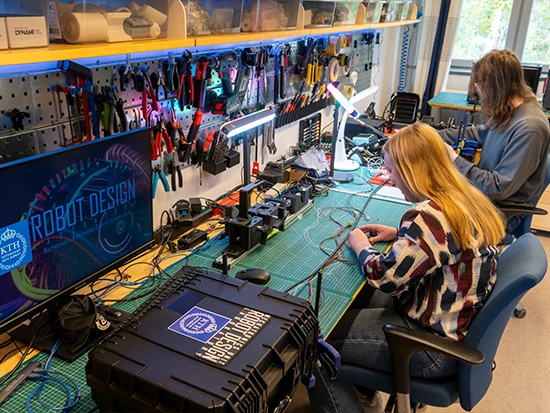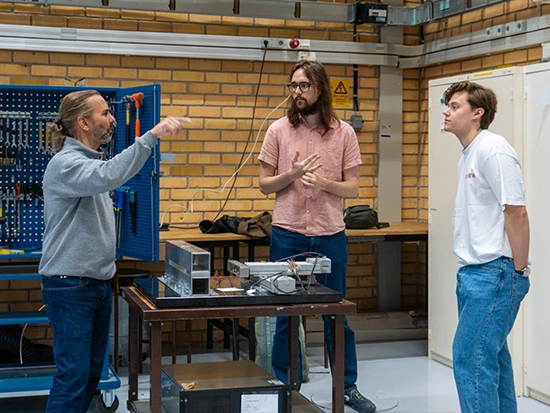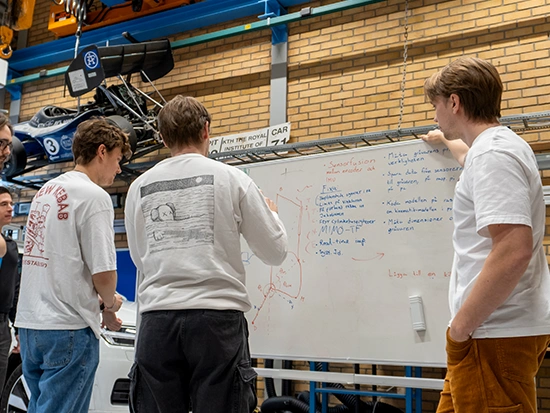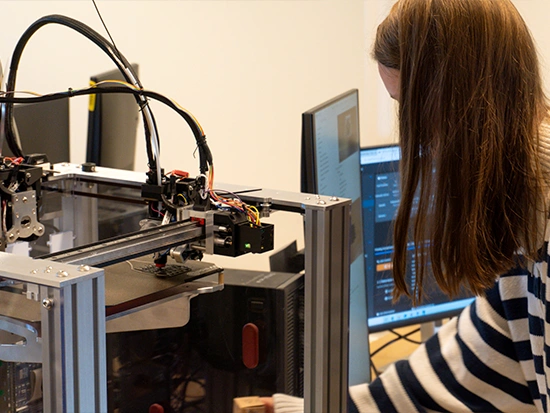MSc Mechatronics
The use of electronics and software to enhance mechanical products is becoming increasingly complex yet critical to meet future functionality and performance needs. Students in the master's programme in Mechatronics explore the synergistic integration of mechanical, electrical, control and software engineering. Graduates work at the forefront of technical and societal paradigm shifts, including the Internet of Things, Circular Economy and Autonomous Systems.
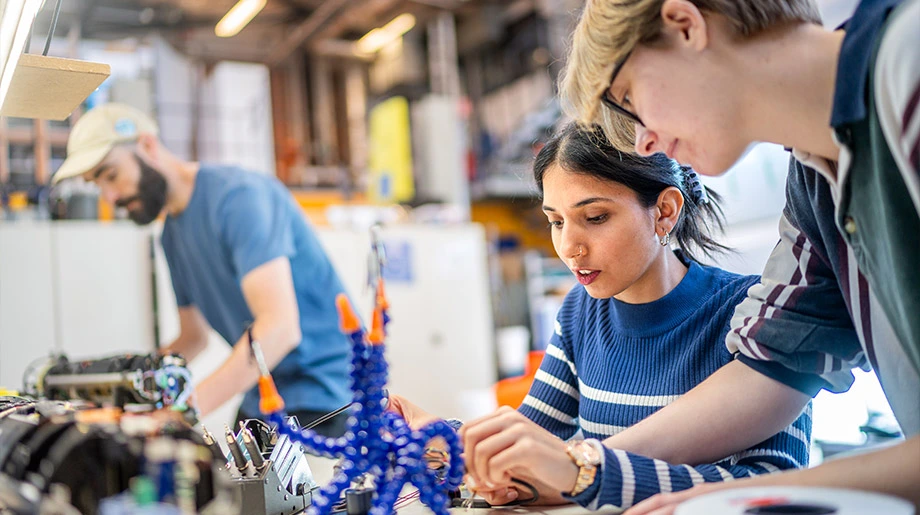
Mechatronics at KTH
Mechatronics combines mechanical, electrical and computer systems to create intelligent, user-friendly products and services. KTH's research and education activities within Mechatronics are conducted closely with a wide range of industries, offering excellent opportunities to complete smaller projects during your studies and your final degree project at a company. In the longer term, this close collaboration also enables us to identify future industry needs and evolve our curriculum and teaching accordingly.
Growing demands on functionality, sustainability and innovation continuously increase the complexity of product development. Another challenge facing many engineers today is the sheer scale of information exchange and communication required in product development. These challenges significantly affect mechatronics engineers since they rely on multidisciplinary knowledge and skills and an increasingly broad awareness when interacting with design teams across other disciplines. In response to these challenges, our programme focuses heavily on problem-based learning, hands-on lab experience, teamwork, project organisation, communication and management. You will gain a cross-disciplinary holistic understanding of design and development, preparing you for large complex projects in industry or academia. The KTH Prototype Centre offers a machine shop and an impressive aggregation of scholars, PhDs, professors and students. They have the skills and tools to prototype your product and can significantly support your studies and any additional projects you undertake. You will also have the opportunity to work with the equipment yourself in our Capstone and master's degree project. From 3D printing and laser engraving to waterjet cutting, vacuum forming, and CNC milling, you will have access to a wide range of equipment.
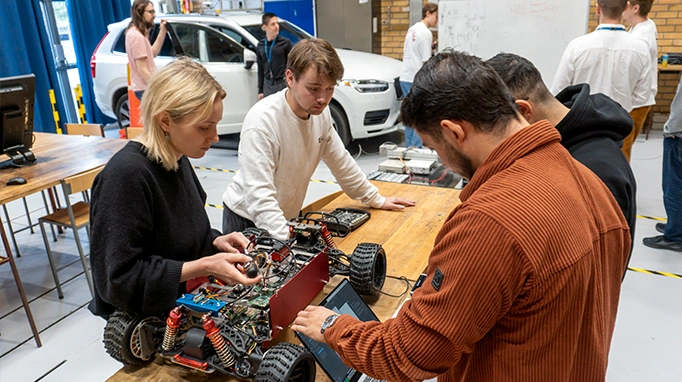
During your studies, you will develop key competencies in motion control, robotics, embedded systems, real-time programming and distributed systems. Alongside these core subjects, you can specialise in areas such as control engineering, artificial intelligence and machine learning, robotics, and medical technology. You can also explore other areas relevant to today’s industries, including digital twins, edge computing, autonomous driving and cyber security.
As a student in the master's programme in Mechatronics, you will develop the skills necessary to conduct professional development work in almost any engineering field. In summary, upon completion of the programme, you will be able to:
- Professionally apply systematic engineering methods to address complex, multidisciplinary real-world engineering problems related to robotics and mechatronics systems.
- Proficiently apply advanced, integrated technical knowledge in mechatronics and the underpinning sciences and scientific methods.
- Identify and critically evaluate current developments and emerging trends within the robotics, intelligent systems, and industrial automation sectors.
- Understand the contextual factors that influence professional engineering practice, and identify the potential societal, ethical, and environmental impact of engineering activities.
- Communicate effectively with colleagues, other engineering professionals, and the broader community using various communication tools.
- Engage in independent investigation, critical reflection, and lifelong learning to continue practising at the discipline's forefront.
- Work effectively and proactively within cross-cultural, multidisciplinary teams, demonstrating autonomy, ethical conduct, expert judgement, adaptability, and responsibility to achieve engineering outcomes at a high standard.
This is a two-year programme (120 ECTS credits) given in English. Graduates are awarded the degree of Master of Science. The programme is given mainly at KTH Campus in Stockholm by the School of Industrial Engineering and Management (at KTH), with access to facilities at the Department of Engineering Design and the KTH Prototype Centre.
Courses in the programme
The mandatory courses in the programme cover topics such as robust mechatronics, motion control, robotics, embedded systems, real-time programming, distributed systems, systems engineering and cyber physical systems. With a long list of conditionally elective couses you can specialise in areas such as AI, robotics, control, ML, innovation and management.
Courses in the programme Mechatronics
Future and career
The demand for Mechatronics is rapidly growing worldwide in many fields, and our graduates can expect to find job opportunities in a wide range of industries and sectors, such as automotive, aerospace, robotics, medical engineering, industrial manufacturing and automation, and autonomous driving. Graduates take on roles as product developers, technology specialists, project managers, embedded software engineers and entrepreneur. The programme also opens the way for a career in academic research, with graduates going on to PhD studies at KTH and other prominent technical universities.
Many of our students start their careers with companies here in Sweden, such as AFRY, Atlas Copco, DeLaval, Electrolux, Ericsson, Mycronic, Prevas, Saab, Scania, Skogforsk, Volvo Cars, Volvo Construction Equipment and WesDyne. Some graduates also go on to start up their own companies, such as Fengco, Quandify and Relox Robotics or to work with other smaller companies that require the unique blend of expertise that is Mechatronics.
Sustainable development
Graduates from KTH have the knowledge and tools for moving society in a more sustainable direction, as sustainable development is an integral part of all programmes. The three key sustainable development goals addressed by the master's programme in Mechatronics are:


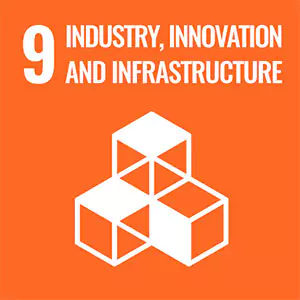
As a broad interdisciplinary engineering discipline and research field, Mechatronics connects to most, if not all, sustainable development goals (SDGs). However, SDGs 3, 7 and 9 are particularly relevant for the three specialisation courses in the programme.
SDG 3 aims to ensure healthy lives and promotes well-being for all ages and refers explicitly to drastically reducing the number of deaths and injuries from road traffic accidents. As a student in the master's programme in Mechatronics, you will learn the skills in embedded systems development and control theory required to work with advanced vehicle technology for, among other things, automatic braking, lane assist or even autonomous driving.
SDG 7 aims to ensure access to affordable, reliable, sustainable and modern energy for all. Many renewable energy sources are very susceptible to energy losses during transmission and distribution. As a student in the programme, you will learn how to solve such problems through the optimised control of complex mechanics.
SDG 9 aims to support the building of resilient infrastructure, the promotion of inclusive and sustainable industrialisation, and the fostering of innovation. As a student in the programme, you will learn how to design the robust mechatronics required to operate advanced critical infrastructure, incorporating sensors and actuators to increase resilience.
To summarise, the master's programme in Mechatronics will provide you with the skills required to work within the key industries that drive the upcoming changes needed by our society to adjust to a sustainable future.
Faculty and research
Our faculty in Mechatronics comprises around 40 staff members (professors, researchers, postdocs and PhD students). Our research focuses on developing methods and tools for model-based systems design, development of advanced mechatronics systems, architecture design and safety. We work within four main areas.
Trustworthy Cyber-Physical Systems
As machines become more electrified, automated and software-driven, it is essential to ensure that they are trustworthy. We have over 40 years of experience in Cyber-Physical Systems. Together we shape a future with highly automated, connected and collaborating machines powered by software and artificial intelligence. KTH hosts one research centre, TECoSA , and multiple projects in the area, including ENTICE , StorAIge , TRUSST-E , TADDO and ADinSOS .
Model-based Systems Engineering
We use modern Model-Based Systems Engineering (MBSE) techniques for integrated design, analysis and control of mechatronic systems, including architectural, requirement, behavioural, simulation and analysis models, and modelling tool integration. One research project in the area is Salience4CAV .
Robot Design
Engineers and designers in the robot design field take a holistic mechatronic approach, considering factors such as the robot's intended function, physical form and structure, movement and autonomy. We use integrated sensors and applied AI to design, develop and control robot systems. Some research projects in the area are EXHILO , HARU , IRIS and SocketSense .
Autonomous Systems
We create independent systems - including self-driving cars, drones and robots - with applications in manufacturing and transportation. Key challenges include perception of the environment, decision-making, safe human interaction, and adapting to dynamic environments with incomplete or uncertain information. Some research projects in the area are AD-EYE , FIRE and WILDCAT .







